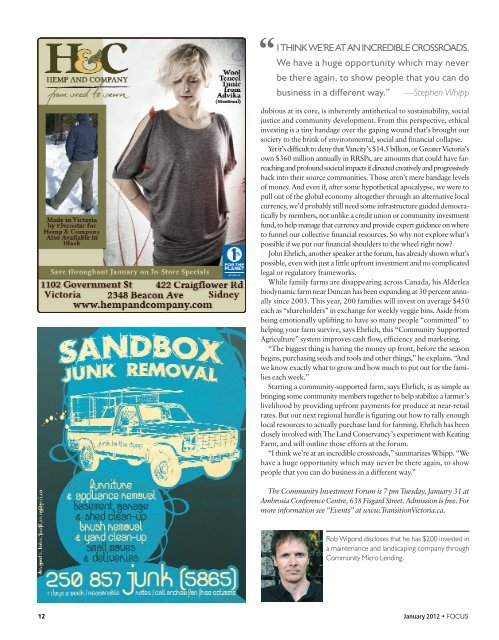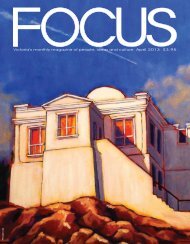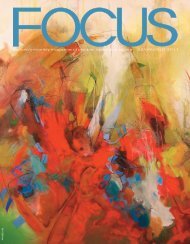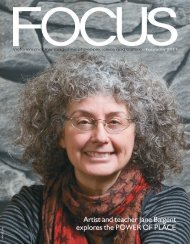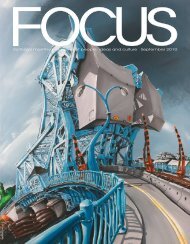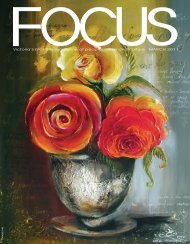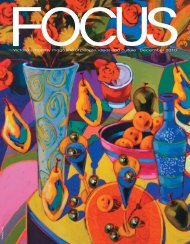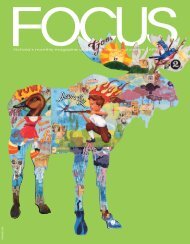You also want an ePaper? Increase the reach of your titles
YUMPU automatically turns print PDFs into web optimized ePapers that Google loves.
“<br />
I THINK WE’RE AT AN INCREDIBLE CROSSROADS.<br />
We have a huge opportunity which may never<br />
be there again, to show people that you can do<br />
business in a different way.” —Stephen Whipp<br />
dubious at its core, is inherently antithetical to sustainability, social<br />
justice and community development. From this perspective, ethical<br />
investing is a tiny bandage over the gaping wound that’s brought our<br />
society to the brink of environmental, social and financial collapse.<br />
Yet it’s difficult to deny that Vancity’s $14.5 billion, or Greater Victoria’s<br />
own $360 million annually in RRSPs, are amounts that could have farreaching<br />
and profound societal impacts if directed creatively and progressively<br />
back into their source communities. Those aren’t mere bandage levels<br />
of money. And even if, after some hypothetical apocalypse, we were to<br />
pull out of the global economy altogether through an alternative local<br />
currency, we’d probably still need some infrastructure guided democratically<br />
by members, not unlike a credit union or community investment<br />
fund, to help manage that currency and provide expert guidance on where<br />
to funnel our collective financial resources. So why not explore what’s<br />
possible if we put our financial shoulders to the wheel right now<br />
John Ehrlich, another speaker at the forum, has already shown what’s<br />
possible, even with just a little upfront investment and no complicated<br />
legal or regulatory frameworks.<br />
While family farms are disappearing across Canada, his Alderlea<br />
biodynamic farm near Duncan has been expanding at 30 percent annually<br />
since 2003. This year, 200 families will invest on average $450<br />
each as “shareholders” in exchange for weekly veggie bins. Aside from<br />
being emotionally uplifting to have so many people “committed” to<br />
helping your farm survive, says Ehrlich, this “Community Supported<br />
Agriculture” system improves cash flow, efficiency and marketing.<br />
“The biggest thing is having the money up front, before the season<br />
begins, purchasing seeds and tools and other things,” he explains. “And<br />
we know exactly what to grow and how much to put out for the families<br />
each week.”<br />
Starting a community-supported farm, says Ehrlich, is as simple as<br />
bringing some community members together to help stabilize a farmer’s<br />
livelihood by providing upfront payments for produce at near-retail<br />
rates. But our next regional hurdle is figuring out how to rally enough<br />
local resources to actually purchase land for farming. Ehrlich has been<br />
closely involved with The Land Conservancy’s experiment with Keating<br />
Farm, and will outline those efforts at the forum.<br />
“I think we’re at an incredible crossroads,” summarizes Whipp. “We<br />
have a huge opportunity which may never be there again, to show<br />
people that you can do business in a different way.”<br />
The Community Investment Forum is 7 pm Tuesday, January 31 at<br />
Ambrosia Conference Centre, 638 Fisgard Street. Admission is free. For<br />
more information see “Events” at www.TransitionVictoria.ca.<br />
Rob Wipond discloses that he has $200 invested in<br />
a maintenance and landscaping company through<br />
Community Micro Lending.<br />
12 January <strong>2012</strong> • FOCUS


